Seekae One
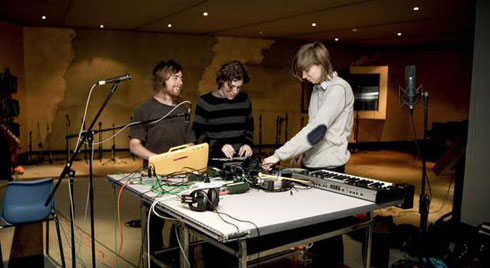
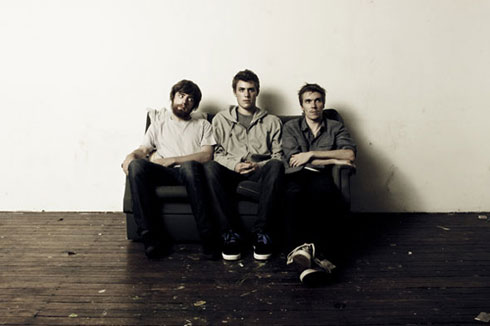
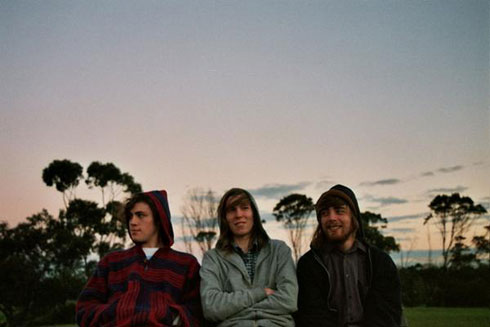
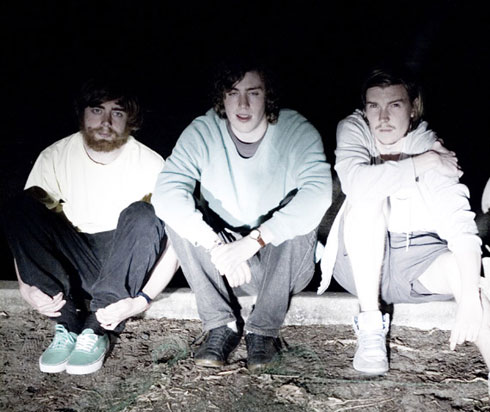
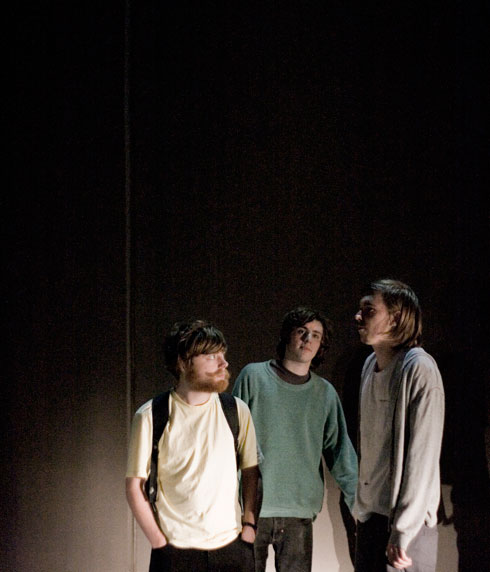
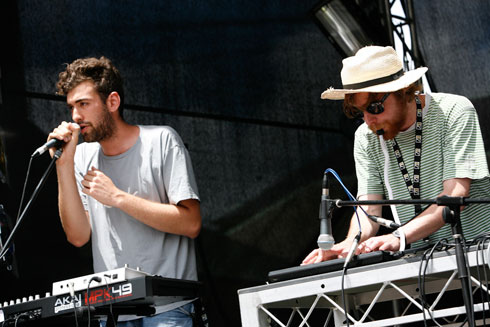
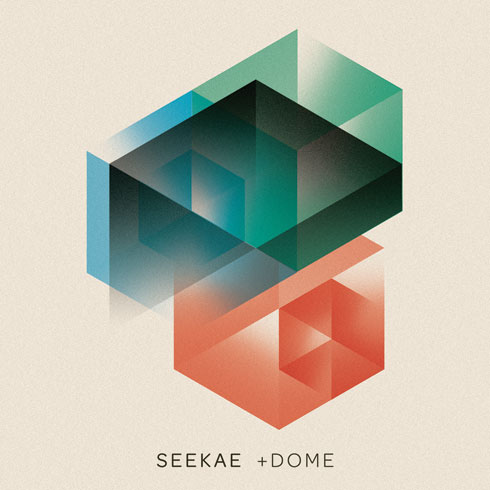 Text: Digby Woods Images: Seekae
Text: Digby Woods Images: Seekae
Ever since Cut Copy went from nothing to something, it seemed like Melbourne had become the capital of decent electronic music in Australia. But that all changed in December 2008, when a little-known Sydney-based electronica-trio known as Seekae released their debut album, The Sound of Trees Falling on People, described by FBi Radio as one of the top ten albums of the decade.
Although they have been categorised as everything from ‘ghetto ambience’ to ‘post-dub-step’, the fact that the music media are continually, and failingly, trying to classify Seekae’s unique sound speaks only of their innovative depth.
Now, just over two years later, Seekae are set to release their sophomore album, +Dome, in which stylistic maturation is clearly evidenced in both production and song-writing, thus contributing to a tighter, more structured sound.
Digby Woods managed to catch up with one-third of the trio, George Nicholas, to talk about Seekae’s humble beginnings, the transition from The Sound of Trees… to +Dome, the OneOFour Collective, and why wet t-shirt competitions are a good place to meet future band-members.
Digby Woods: So how did the three of you originally meet?
George Nicholas: Well, Alex (Cameron) and I went to primary school together, we were in the concert band – he was on trombone, I was on flute (laughs). After that, I didn’t see him again for eight years until I bumped into him during Schoolies Week in Byron Bay at the back of this terrible nightclub where there was a wet t-shirt competition, and we just started chatting about music. Al was in another band with this guy, John (Hassel), and we all just kind of got together and started mucking around with some instruments. It was pretty low-key, I guess. We were all mixing stuff on computers before that individually anyway.
DW: What kind of programs were you using back then? GarageBand?
GN: I’d been using some terrible programs like Sony Cakewalk, Sony Acid, Dance DJ, but then you realise, “This sucks” and you upgrade. We all came from different programs. At that time I was making IDM, hip-hop stuff and then progressed from that to more techno stuff, and now it’s sort of come full circle (laughs).
DW: Does that have anything to do with the statement in your press release that says “+Dome is not a continuation but a new beginning.”
GN: Well, the last album was constructed in a completely different way. With The Sound of Trees Falling on People, we didn’t intend to make an album originally, we just collected a couple of years worth of tracks and put them together. With +Dome though, it was more thought-out, we thought about how the album was going to flow and what kind of tracks we wanted here and there.
DW: It definitely sounds more structured.
GN: Yeah, the whole thing is just a bit more considered, it felt like we were doing something a bit different, something that’s a bit more original in the context of electronic music as a whole.
DW: In terms of sound, how would you differentiate your first album from +Dome?
GN: We used a lot more sampling this time around although maybe it’s not as obvious as on The Sound of Trees… For instance, for the track Gnor, the whole second half of the track is based on this one clarinet loop that Alex did. And also all the drums on that track are recorded with a boom-recorder on the street, and then we had people tapping on wood and clapping drumsticks together, so with that song in particular, a lot of organic elements really shine through, particularly towards the end.
DW: So there was a turn towards field-recording for this album?
GN: Yeah, definitely more field-recordings. I mean, in the last album we used a lot more sample packs and straight synthesis, whereas this time around we were working in more of a collaborative environment and were actually able to record people because we had a studio to do so.
DW: You get a lot of love in Australia, but I have yet to see your name crop up on any of the major US music-blogs. Why do you think this is?
GN: I don’t know. I wish we did get a bit more attention overseas. We’re going to go overseas in May, so hopefully we’ll get on the front page of NME (laughs).
DW: Where are you touring in May?
GN: We’re touring in the UK and Europe. We’ve got a few shows booked, I think about six all up, but the main one is the Great Escape festival in Brighton, which should be good because Brighton’s awesome, I went there once and it was mad fun.
DW: Were you there for a festival or were you just there?
GN: I was there for a party in this mansion these people had rented, which had a rotating dancefloor, although it was broken by the end of the night, needless to say. People were trying to make it go as fast as possible, make it take off (laughs).
DW: Are you going to stick around in Europe after the tour?
GN: Yeah, we’re going to stick around for a couple of months, play a few shows around Europe, and probably start on an EP called EuroParty.
DW: In terms of exposure and popularity, you’ve definitely managed to position yourself at forerunners of the ‘downbeat electronica’ style. What do you think it is that makes you different, or more accessible, than any of the other similar electro groups out there at the moment, at least in Australia?
GN: As opposed to bedroom-producers, who would be our main competition, if I’m going to phrase it like that, we’re able to gain exposure through touring and the whole live scene, and I think that’s a big part of it, because I think in Australia it’s kind of polarised between the dance music scene and the ‘pop and rock’ scene, there are DJs and bands, and there doesn’t seem to be anything between those two, so maybe we reflect a convergence of those two ideals?
I remember we went to play a show in Hobart and everyone really liked it because they’d never seen two DJs and a drummer before, and that was great.
DW: This kind of minimal, glitchy electronica is becoming increasingly popular, especially when you look at the rise of, not only yourself, but such bands as Mount Kimbie, Gold Panda, Gatekeeper and Oneohtrix Point Never. Why do you think now is suddenly the time for people to be paying attention to this mind of music, as opposed to five or 10 years ago, when it was more underground?
GN: That’s a hard question. I think the quality of music and the field has really blossomed in the last two years. There are just so many artists coming through who aren’t playing purely synthetic or club-based material. It’s kind of what I said before, this convergence between dance music, which traditionally isn’t radio-friendly, and pop music, which isn’t usually club-friendly.
DW: So a hybridisation essentially?
GN: Yeah, exactly.
DW: The continuing sophistication of music software and technology, and the ease with which people can obtain them these days, is also allowing for nearly anyone to create great music from their bedrooms.
GN: Exactly, everyone is on a pretty level playing field. It’s pretty easy now to set up a home studio and smash out an album, all you really need is a computer and some pirated software and a pair of headphones. I’m not endorsing the use of pirated software, but it’s a reality for many people (laughs).
DW: Well, it does seem to be the way the music industry is going, everything is being democratised. How do you feel about it, being an artist?
GN: I think it’s great, I don’t think there’s anything wrong with it at all. I do think it’s a shame that some of the major labels who made a name for themselves years ago are having a hard time now, but it seems to be for the greater good because now anyone in the music world can express themselves and get their music out there, when they wouldn’t have been able to 10 years ago.
DW: What ideas were circulating when you came to produce this +Dome, compared to The Sound of Trees…?
GN: There were a lot of different stages. We thought, “Let’s make an album with just guitars, drums and a synthesiser, and no computers,” and then we were like, “Let’s make a pop album,” and then we thought, “Let’s just try and make a really strange, weird album that’s more experimental, but with a few more radio-friendly tracks, basically do what we want instead of trying to mix too many genres together.”
DW: What influences have you drawn on for creating the unique Seekae sound, not only in creating +Dome, but also just in general?
Early influences would be pretty broad. People like Vangelis, Aphex Twin, lots and lots of West Coast hip-hop, and then more recently, Mount Kimbie, who I’m really excited about playing with this month. And a lot of stuff from the London scene, a lot of dub-step artists, like Code 9, he’s always been there for me.
DW: Do you mean proper ‘dub-step’, or what people are now referring to as ‘post-dub-step’?
GN: Both. I used to listen to the heavier ‘dub-step’ a lot more, but now I’m listening to what I guess you’d call ‘techy dub-step’, people like Ramadan Man, and some ‘grime’ artists like Newham Generals and Tempa T.
DW: Something I haven’t read a lot about is your part in the OneOFour Collective, a group you founded consisting of beatmakers all hailing from Sydney. What is your part in the Collective and how did it come about?
GN: We just talked about it a lot, John and Alex and I, and then we met up with Cleptoclectics (Tom Smith), who was a lecturer at my university, and 48/4, so we all got together, and then a whole bunch of other people like Roleo came along, and we just came up with the idea of releasing mixtapes. It’s really fluid. Although we have lost a bit of momentum recently because everyone’s been on holiday, but really it’s just a group of buddies getting together, having some drinks and listening to beats.
I think with OneOFour, we just got sick of those online communities of like-minded beatmakers, and it was just good to meet up with real people.
DW: Rather than faceless online pseudonyms.
GN: (Laughs) Yeah exactly, like, “Hey, check out my SoundCloud. Leave a comment.” I mean, that world is really constructive, but sometimes you just need to meet the people and hang out.
DW: Did the OneOFour Collective come about after your initial success as Seekae?
GN: Well, the OneOFour Collective is distinct from Seekae, in that it’s the constituent parts of Seekae that are involved in OneOFour rather than Seeake as a group. For instance, Alex goes under the moniker of Stuttah, John goes under Peon, and I’m Jenson Brewster. So Seekae doesn’t officially have anything to do with OneOFour, but as solo artists we’re all involved in it.
Originally, we did shows as OneOFour, as the Collective, and everyone kind of relied on OneOFour as this vehicle to get you somewhere, whereas now it’s become more informal, and everyone is just using the mixtapes as a platform to release music. So it’s a lot more free-form and relaxed now.
DW: Although you are now considered one of the best live electronica acts in Australia, when you first started making music as Seekae, did you ever give any forethought as to how you would translate your sound to the stage?
GN: Well, because most of tracks are made on computers, it always takes a while to figure out how to translate that properly to a live context. We try not to sacrifice sonic quality too much, and some might say that the result of that is a boring show but, well, fuck them (laughs).
But yeah, it is always a really difficult thing to translate MIDI data, which you mix inside a computer, into a fully-formed live and exciting show that is not only going to interest the audience, but also sound good. I think we’ve finally found that balance though between sonic quality and not making the crowd fall asleep (laughs).
DW: Well, that obviously hasn’t happened so far, so fingers crossed.
GN: (Laughs) No, no one’s passed out yet.
DW: Since Daft Punk scored the recent Tron: Legacy film, and hence opened the doors for electro artists to compose films, if you were given the opportunity, what film would you most want to score, whether past, present or future?
GN: Bad Boys 3 would be up there, definitely. I’m just waiting for the call from Will Smith.
DW: Would you bring forth more of the hip-hop influence in that case?
GN: Yeah, we’d just buy a fuck-ton of MP3s and records, and just sit there and sample them all. I’d love to do one of those types of movies.
DW: Even if it wasn’t Bad Boys 3 though, would film composing be something you’d jump at the chance to do?
GN: Definitely, absolutely. That would be my dream, to do that for a living, and I’d do anything, I’d do Legally Blonde 10, I couldn’t give a fuck (laughs).
Seekae’s sophomore album, +Dome, is out March 25 on Rice Is Nice and Popfrenzy Records. They are also supporting Mount Kimbie on their Australian tour from March 4-11. Get the full dates.
Seekae
Next story: Jaeger Cube – Renee Jaeger



